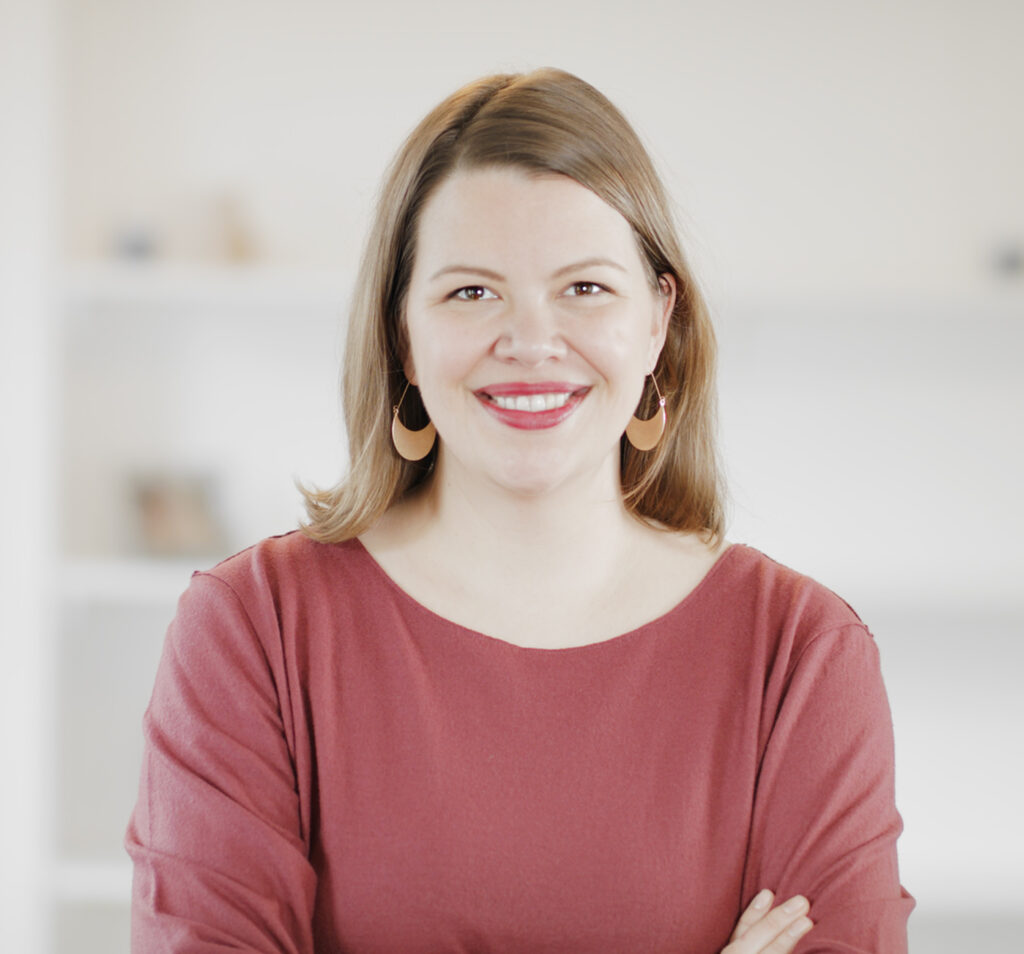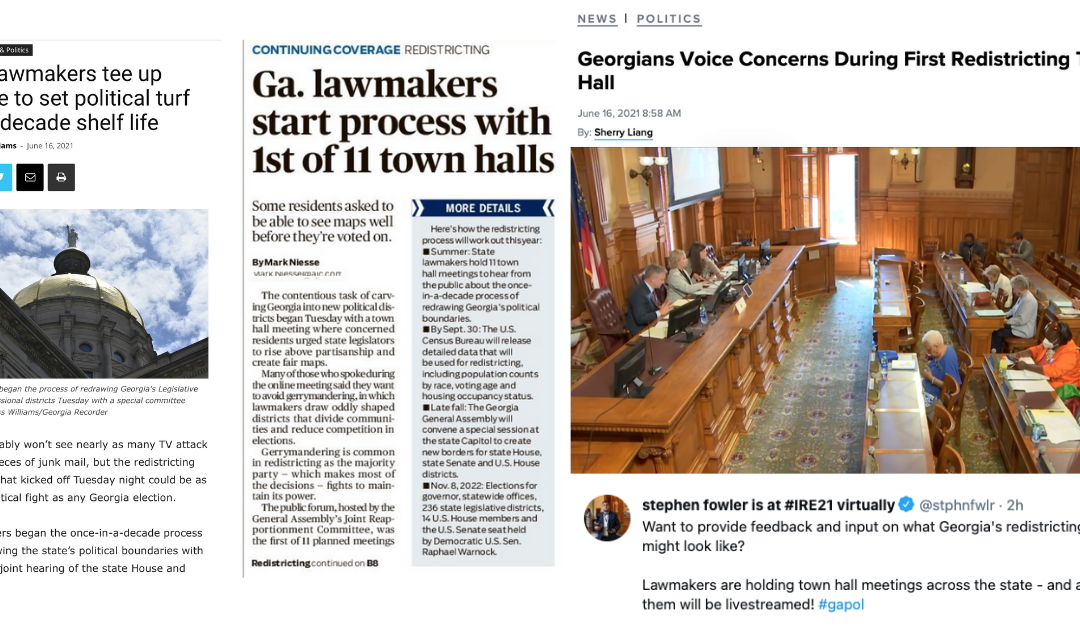Updated June 23
Next Joint Reapportionment Hearings June 29 and 30
All hearings set by the Joint Senate and House Reapportionment Committees are set for 5-7 pm, with the next hearings in Cumming on June 29 and Dalton on June 30 at the locations below:
June 29 – Cumming
South Forsyth High School – Cafeteria
585 Peachtree Parkway
Cumming, GA 30041
June 30 – Dalton
Dalton State College – Goodroe Auditorium – Room 144
656 College Drive
Dalton, GA 30720
All hearings will be live-streamed at the Georgia General Assembly website.
Georgia residents are encouraged to submit written testimony using the form on the General Assembly website.
To testify during in-person hearings, citizens will sign up at the meeting locations beginning at 4:30 p.m. outside the meeting rooms. Testimony is limited to two minutes which is strictly enforced. Sign-ups are limited to a number which can be accommodated during the two hours set for the meeting.
Specific meeting locations for the remainder of the hearings have not been announced, despite please from advocacy groups for adequate notice. The cities and dates for the July hearings are as follows:
July 6 – Athens
July 7 – Augusta
July 26 – Brunswick
July 27 – Albany
July 28 – Columbus
July 29 – Macon
July 30 – Virtual
Previously, the testimony was at the top. Let’s leave the testimony below this newly updated section and give it a new headline which reads along the lines of:
Notable Testimony From Earlier Public Hearings
News accounts from the Atlanta Journal and Constitution, GPB, and The Georgia Recorder can’t possibly give the full testimony offered during the two hour hearing and so below, we have collected several statements read during the hearing to give you a fuller idea of what is being said.
 Minority Leader Gloria Butler
Minority Leader Gloria Butler
Remarks during 6-15 Reapportionment Hearing
As Minority Leader of the Georgia State Senate, I recognize that fair maps are crucial to ensuring that every Georgian’s vote counts equally. But fair maps require 1) a transparent redistricting process that 2) truly values public input and 3) empowers historically disenfranchised communities.
CHANGING DEMOGRAPHICS OF GEORGIA
Our state has experienced a significant demographic shift. Over the past ten years, the Black population in Georgia has grown by 14%, the Asian population has grown by 40%, and the Hispanic population has grown by 26%, while the white population has grown by only 2%. The maps that we adopt during the 2021 Special Legislative Session must reflect the changing face of Georgia and the need for historically disenfranchised voters to have a voice.
TRANSPARENCY
And as Georgia evolves, ensuring that Georgians of color are reflected among their elected representatives requires that we conduct the redistricting process transparently. Too often, legislators are not held accountable for leaving citizens in the dark, unaware of the process for drawing their districts. Georgians are entitled to not only examine the criteria used to create their own districts but also provide substantive feedback on any proposed maps before they are adopted. Democracy cannot happen behind closed doors.
PUBLIC INPUT
Finally, the creation of fair maps requires meaningful opportunities to consider public input. The current process does not yet meet this critical standard. These town halls are being held months before the Census Bureau provides the final redistricting data to the states. They are happening outside of places like Gwinnett County, one of the fastest changing counties in the state. And they are happening with little advance notice. These town halls cannot be the only opportunity for the public to participate in their redistricting process. We cannot draw fair maps for Georgians without Georgians themselves being involved in a meaningful way.
Our redistricting process must be open, democratic, and representative of the interests of all Georgians. I urge the members of the Georgia General Assembly to ensure that we live up to these basic principles during this redistricting cycle. Thank you.
 LaVita Tuff
LaVita Tuff
Policy Director, Asian Americans Advancing justice – Atlanta
Thank you to the chairs of this committee and its members, My name is LaVita Tuff, and I am the Policy Director at Asian Americans Advancing Justice-Atlanta. Advancing Justice Atlanta is the only legal advocacy non-profit in the Southeast that works to defend, resist and advance the civil rights of Asian American Pacific Islanders and immigrant communities across Georgia.
2020 proved that Georgians want to be civically engaged and that includes a desire to be an active participant in the reapportionment process. Yet, with ‘English-only’ approaches and methods, the Georgia legislature will for sure leave out those who want to be engaged, educated, and informed. As is, proposed town halls are by no means accessible or inclusive, especially to those who are considered limited English proficient.
The immigrant population in Georgia has grown to be over a million since 2018. That means one in ten Georgia residents is an immigrant, and 45.9% of immigrants are limited English proficient. Immigrants in Georgia are one of the fastest-growing electorates, leading with AAPI voters who experienced a 47% increase in eligible voters from 2012 to 2018, totaling nearly a quarter of a million. Despite that, 89% of LEP voters do not receive language
1 assistance that they are entitled to . It is important to recognize that Georgia is home to over 100 different languages.
Elected officials represent all residents of Georgia, not just those who are native to the English language. When key information is restricted to English only, LEP residents are deterred from engaging and participating in the redistricting process. It is this committee’s responsibility to make it abundantly clear to the public that they will not be left out of the reapportionment process.
That means informing, educating, and creating equitable access in all the languages the communities of interest speak and read.Language access should not be seen as a privilege and is essential to ensuring that LEP communities are fairly represented in their districts.
The redistricting process ensures that voters are able to have their voices heard and the officials they elected will prioritize their concerns. The process in which districts are drawn affects every political issue, from the economy to healthcare to public education. A lack of transparency in the redistricting process has led to the adaptation of heavily partisan district maps. Georgians across the state want and need a transparent and independent redistricting process that is accessible to all residents.
Because of the timing between the release of census data and when the legislature meets, the public has a very limited window of time to view, understand, and comment on proposed maps. Historically, Georgia politicians have made this process more difficult by holding conversations behind closed doors, ignoring the needs of immigrants and communities of color, and not allocating an appropriate amount of time for the public to comment on the process.
1 ACS 2019, Table C16008, “CITIZENSHIP STATUS BY AGE BY LANGUAGE SPOKEN AT HOME ABILITY TO SPEAK ENGLISH FOR THE POPULATION 5 YEARS AND OVER,” subtracted by total figure of Korean VALEP of Cobb & DeKalb Co. and VALEP of Cobb, Gwinnett, & DeKalb (2016 Census determinations)
Redistricting committees have failed to respond to advocates’ requests for transparency in the map drawing and approval process. Maps are typically manipulated, thus distorting political power and undermining the very principle of having a representative government while keeping Georgians in the dark of what the data truly means. Our top concerns are that the committee, as is, does not allow for meaningful public input to the redistricting process and has done nothing to address fundamental language access gaps, creating barriers for limited English proficient Georgians to participate in the process.
I am here today to demand that additional steps be taken to improve access to this process, specifically for immigrants and communities of color across the state. I am not alone in my concerns about how these hearings are proceeding already. As a member of the Georgia Redistricting Alliance, I along with numerous partnered organizations, demand a transparent and equitable redistricting process. These demands include:
● To ensure public input, the committees must provide communities adequate time and opportunity to discuss and submit suggested maps and written input
● To ensure accountability, the committee must provide a written response to the public’s submissions and clearly indicate whether or not it was deemed applicable and why.
● To ensure a proper release of information, the committee must release proposed maps along with its analysis for public review via a publicly accessible website with downloadable files that do not require software for viewing.
● To ensure that hearings and timeframes are fair, the committee must allow for virtual and remote participation, including citizen testimony. Hearing schedules must be announced at least two weeks in advance to allow citizens from across the state to have ample opportunity to participate.
● To ensure accessibility, the committee must demonstrate a commitment to language access by translating public facing materials into a minimum set of languages required to reach diverse Georgians (at least Spanish, Korean, Vietnamese, Mandarin/Cantonese, Hindi, Arabic) and by providing for interpretation where necessary and feasible to gain public input.
● To further ensure accessibility, this committee must be compliant with S.508 of US Rehabilitation Act on their website, where all materials and information is shared, making it accessible to people with disabilities.
Finally, We must have a redistricting process that incorporates meaningful language access so that all Georgians can participate. Our communities must be part of the process in meaningful ways to ensure that we are not further disenfranchised.
Thank you for your consideration of these matters. I am happy to answer any questions that committee members might have.
 Michelle Zuluanga
Michelle Zuluanga
Latino Community Fund Georgia
Thank you Mister Chair and to the redistricting committee. My name is Michelle Zuluaga and I am the Civic Participation Manager for the Latino Community Fund Georgia. We are a 501 © 3, we lead the Latino for Democracy coalition and are part of the Georgia Redistricting Alliance. Latinos for Democracy is currently leading an effort to educate the latino community about the redistricting process in Georgia. This has not come without its challenges. Although dates and times have been announced to the public about the redistricting public hearings throughout the state; The locations have yet to be announced. This is critical information so that community members will show up and have their say on how these impactful lines will be drawn throughout their communities and ultimately decide the fate that their communities will live. Let me be clear, we need to know the locations of where the hearings will be held well in advance so that community members will be present.
We also ask that when you draw these impactful lines, racial equity be at the forefront of everyone’s mind. It is important for all electoral districts to reflect the communities that live in them and for life changing resources such as parks and recreation, education, and accurate representation at the municipal, state and federal level to be set in place for all.
As communities change and become more diverse, it is critical for district maps to reflect that. When we have accurate representation our communities get access to resources that many take for granted such as language accessibility, access to the polls, public transportation, and a place for our community members to gather and connect as one. This is why we stand with many when we say we want maps that will Unite our state and not divide our communities. This is why we need Unity Maps.
Unity Maps: when diverse communities come together to define district maps that ensure their communities collectively can elect candidates of choice.
 Rebecca DeHart
Rebecca DeHart
CEO, Fair Count
Thank you for attending today’s press conference. I’m Rebecca DeHart with Fair Count, a 501(c)3, non-partisan, non-profit organization. We were founded prior to the 2020 Census, and have since used a multitude of civic engagement opportunities to build long-term power – often in the very communities that are most impacted by partisan redistricting. Today, my comments will focus on the inclusion of public input in the redistricting process.
We are in unprecedented times. The decennial census concluded months after it was supposed to, after experiencing great challenges. Delays to the census data have further delayed the redistricting data. States will now receive the raw file, or Legacy file, on August 16, with the full redistricting file expected just before September 30. Because of the timing of residency requirements in Georgia and the springtime qualifying deadline, it may appear that the process needs to be rushed.
But that would be a mistake; too much is at stake.
It is crucial to a fair and functioning democracy that the redistricting process not cut out public participation – either inadvertently, or on purpose, by using the guise of a rushed timeline to pass maps that have not been studied, evaluated or commented on by the very people its lines separate.
We have seen the result of partisan redistricting in very stark images this past year and a half. Communities heard by policy makers are the communities who receive responses and resources. Districts drawn to silence certain communities, particularly communities of color, have left too many without a voice. This is abundantly clear since the onset of the pandemic.
We’re on the road to recovery from COVID-19, but it will take the voices of residents being heard by relevant leaders to direct the path we take over the next 10 years, and to respond to the needs unique to a community. For us, using COVID Recovery has been a powerful tool in teaching communities about redistricting. As has community mapping.
Fair Count has begun working with people and communities across the state to create community maps, through a partnership with the Princeton Gerrymandering Project. Our organizing team meets with individuals and communities and trains them on the mapping process. Participants are able to share their various communities of interest– things like cultural boundaries, school zones, faith communities, healthcare catchment areas, and other geographies that tell a community’s story on an actual map. We will make these maps available to legislators so that they can incorporate the voices of the people into map drawing.
While gathering input over the next eleven meetings is important, we hope to see a process that continues gathering public feedback from residents throughout the state after the first draft of the maps are drawn.
For fair districting to happen, community voices must be included.
The backbone of our democracy is the idea that voters pick our leaders. Leaders picking their voters is poisonous to our ideals and devastating to the communities left out. Let’s get this right. Let’s not pack, stack and crack districts, instead, let’s draw lines that allow ALL Georgians the right to be heard, and the ability to thrive.
 Alex Ames
Alex Ames
Student, Georgia Tech
Thank you. My name is Alex Ames, and I’m a community organizer and student at Georgia Tech in Atlanta. I’m actually taking time out of class to be here. Now, Georgia Tech is currently nested within State House District 56, but is divided between State Senate districts 36 and 39. Georgia Tech is a powerhouse – our school has been around since 1885, we’re the third largest college in the state, and our graduates are the future of Georgia’s economy. But because our representation is divided, we vote in different locations, and we cannot effectively lobby our legislators to meet the needs of our community. We share a transit system, a housing system, community spaces, and classes, yet we’re denied our ability to advocate collectively for our interests as a campus. For example, projects that include funding for USG and green space access for a uniquely young, and innovation-minded community like GT often require us to get support from legislators – being divided into two districts weakens our voices.
This isn’t something new – all across the state, Georgia’s campuses of nearly half a million students are gerrymandered and sliced in ways that stifle the voices and interests of the next generation of GA leaders. From Kennesaw to Athens, our schools are divided so that even though our state had the largest youth turnout in America last year, our votes are worthless. We all want American citizens to be active participants in democracy, but what does it teach our students when we draw their maps so that even when they do vote, their voter efficacy is stifled? We’re teaching young people to distrust and disengage in our democracy by gerrymandering them. If we want American democracy to be vital for decades to come, we must ensure our Georgia campuses have the representation that lies at the core of our nation’s democracy – one person, one vote, and equal representation for us all. I implore you to draw fair maps for my campus Georgia Tech and for all students in Georgia.

